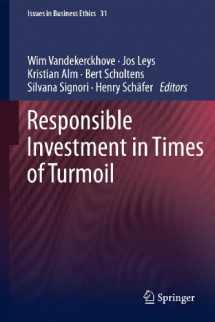
Responsible Investment in Times of Turmoil (Issues in Business Ethics, 31)
ISBN-13:
9789048193189
ISBN-10:
9048193184
Edition:
2011
Author:
Vandekerckhove
Publication date:
2011
Publisher:
Springer
Format:
Hardcover
260 pages
FREE US shipping
Book details
ISBN-13:
9789048193189
ISBN-10:
9048193184
Edition:
2011
Author:
Vandekerckhove
Publication date:
2011
Publisher:
Springer
Format:
Hardcover
260 pages
Summary
Responsible Investment in Times of Turmoil (Issues in Business Ethics, 31) (ISBN-13: 9789048193189 and ISBN-10: 9048193184), written by authors
Vandekerckhove, was published by Springer in 2011.
With an overall rating of 4.3 stars, it's a notable title among other
books. You can easily purchase or rent Responsible Investment in Times of Turmoil (Issues in Business Ethics, 31) (Hardcover) from BooksRun,
along with many other new and used
books
and textbooks.
And, if you're looking to sell your copy, our current buyback offer is $0.3.
Description
The SRI phenomenon is said to be entering the mainstream of financial intermediation. From a fairly marginal practice promoted or campaigned for by NGO’s and at odds with financial practice and orthodoxy it grew into well formulated policy adopted by a wide range of investors. Academic literature on SRI has also boomed on the assumption that mainstreaming is taking place. However, little thinking has been carried out on questions specifically arising from this alleged ‘mainstreaming’. This book, addressed to those with a scholarly or practitioner’s interest in SRI, starts filling this neglected dimension. Today, one cannot ignore the difficulties of main stream financing. The financial spheres are trembling globally in one of the worst crises since the 1930’s. As a response to the crisis, the intermediation of ‘financial responsibility’ will undoubtedly be the subject of new regulation and scrutinizing. This book looks into what these turbulences will imply for SRI. In view of these circumstances, one might or even should, ask oneself whether the phenomenon was not an empty fad during the exuberant high of financial euphoria that came abruptly to an end with current financial crises. To put it rather sec: are financial intermediaries that promote ‘sustainability’ credible, while it is obvious that some developments in financial intermediation -predictably, as some say- were unsustainable? Is this an opportunity for enhancing SRI because of the strength and superiority it has developed or will it disappear due to a return to financial myopia? This book is the first to question the future of SRI in such a radical way.


We would LOVE it if you could help us and other readers by reviewing the book
Book review

Congratulations! We have received your book review.
{user}
{createdAt}
by {truncated_author}


